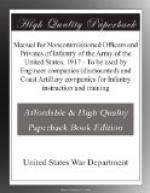The best protection against artillery fire is a constant but irregular movement to the front. When close to the enemy’s position his fire is least effective.
A knowledge of how to use the bayonet and the will to use it must often be the deciding factors in battle.
Finally:
In infantry training we can not go far wrong or fail to accomplish the best results if we keep before our minds the spirit as well as the wording of paragraph 352 of the Infantry Drill Regulations: “The duties of infantry are many and difficult. All infantry must be fit to cope with all conditions that may arise. Modern war requires but one kind of infantry—good infantry.”
SECTION 2. COMBAT.
The field of battle is the final test of the instruction, discipline, and efficiency of the fighting force of any army.
The battalion is the attack unit or the defense unit, whether operating alone or as part of a regiment. The companies constitute the firing line and the support.
An individual soldier is concerned only with the enemy in his immediate front, in obeying orders, and instinctively doing what he has been trained to do.
The one requisite necessary to win the battle is intelligent team work. The army is handled just like a football team. A part is on the first line facing the enemy. Another part, like the half backs, is held back as supports. Another part, like the full backs, is held as a reserve. Each unit, like each player, has a certain duty to perform. When the signal is given, all work together—all play the game—team work. The players consist of all branches of the service.
The same rule holds true down to the smallest unit and even to the individual enlisted man. Each regiment is a team composed of three players—each a battalion. Each battalion is a team of four players—each a company. In the same manner each company is a team of two or more platoons; each platoon a team of two or more squads; and last, but not least, each squad is a team of eight players.
The one question that always presents itself on the battlefield every minute of the time to every person, whether he be a general or a private, is “What play has my team captain ordered, and how best may I act so as to work in conjunction with the other players to bring about the desired result?”—team play.
To the Infantry private this means—
First. Prompt and loyal obedience to the squad leader. Every squad always has a team captain. If the squad leader is killed or disabled, another player previously designated takes his place. If no one was designated, then the private with the longest service takes command. When the squad leader gives the command for a certain play, don’t stop to think if the play is a good one, but do your very best to carry ont the play as ordered. A poor play in which every player enters with his whole heart (team work) will often win, while, on the other hand, the best play in which some of the players are skulkers and shirkers will probably fail.




